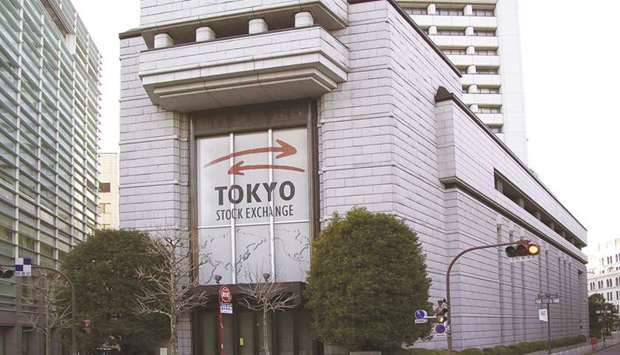Asian stocks started the week on the back foot yesterday, with investors still in a gloomy mood after several days of market turbulence sparked by trade rows and a spat over the US central bank.
Meanwhile, European shares struggled for direction in early exchanges as traders wrestled with a cornucopia of risks, including higher oil from Saudi Arabia tensions and ongoing turmoil surrounding Brexit and Italy’s budget.
In Asia, Japanese equities led the way lower, with the benchmark Nikkei 225 shedding almost 2%, in anticipation of an announcement from Prime Minister Shinzo Abe of a two percentage-point hike in the sales tax.
Abe also vowed a series of measures to cushion the expected blow to consumption but many analysts have warned the rise in sales tax could stymie growth in the world’s third-top economy. “We have never seen a share price rise in the past after an announcement of a sales tax hike,” noted Kyoko Amemiya, senior market strategist at SBI Securities.
Japanese stocks also came under pressure after US Treasury Secretary Steven Mnuchin said over the weekend the US wants to include a provision to prevent currency manipulation in future trade deals with Japan.
Chinese stocks, which were the worst hit in last week’s global rout, also tracked lower, with the benchmark Shanghai composite off one and a half per cent.
Markets in Hong Kong, Australia and South Korea were also in the red, with the Hang Seng giving up more than 1%.
“We can’t say the shock is over,” said Masayuki Kubota, chief strategist at Rakuten Securities. European markets however were steady at the open, with London’s benchmark FTSE up 0.1%, the Paris CAC 40 completely flat and the Frankfurt open delayed for technical reasons.
Last week saw a broad-based sell-off in global equities, prompted by fears of higher US interest rates, continued worries over US-China trade and attacks by President Donald Trump on the Federal Reserve, which he called “crazy”. On Friday, the bulls attempted a fight-back but found it hard going in another seesaw session.
Early European gains fizzled and the Dow Jones closed up 1.2% following late buying but it also dipped into the red for part of the session.
This week, traders are expected to focus on a raft of economic data and dozens of company results.
Turning to commodities, oil prices continued to soar as traders fretted over US relations with its ally and the world’s top oil producer Saudi Arabia.
Trump has warned of “severe punishment” if it is revealed that journalist Jamal Khashoggi was murdered inside the kingdom’s consulate in Istanbul but Riyadh hit back immediately, saying it would retaliate.
Geopolitical tensions surrounding Saudi Arabia battered shares in Japanese conglomerate Softbank, which has close financial ties to the kingdom.
Softbank stock plunged more than 7% in Tokyo, as Riyadh is heavily involved in the firm’s massive technology investment fund. Both Brent Crude and WTI oil prices surged, which was also a factor in declining stocks, analysts said, although the gains dropped back somewhat in later trading.
On the foreign exchange markets, the pound was hit by further uncertainty over Brexit talks after last-ditch negotiations between London and Brussels failed to make headway on the vexed question of the Northern Irish border.
There were also reports that Prime Minister Theresa May could be the victim of a cabinet rebellion and that her coalition partner, the Northern Irish Democratic Unionist Party (DUP), could vote down her budget, possibly triggering another election.
In Tokyo, the Nikkei 225 closed down 1.9% to 22,271.30 points; Hong Kong — Hang Seng ended down 1.38% to 25,445.06 points and Shanghai — Composite closed down 1.5% to 2,568.10 points yesterday.

An external view of the Tokyo Stock Exchange. The Nikkei 225 closed down 1.9% to 22,271.30 points yesterday.


